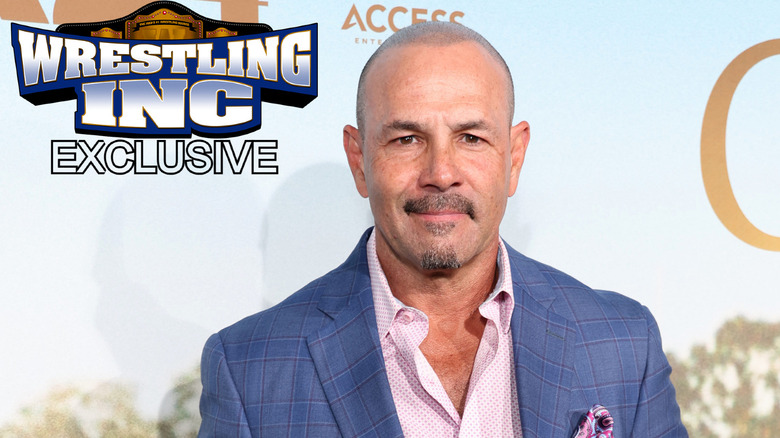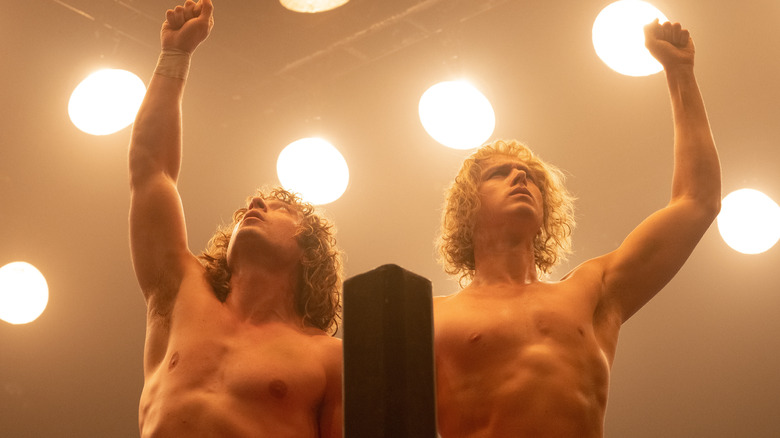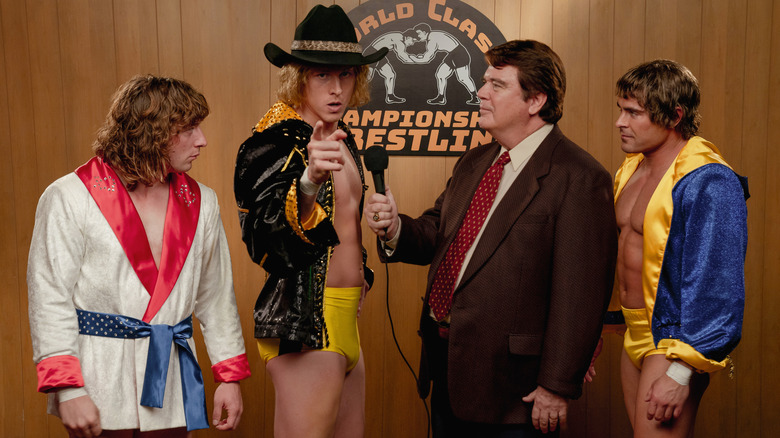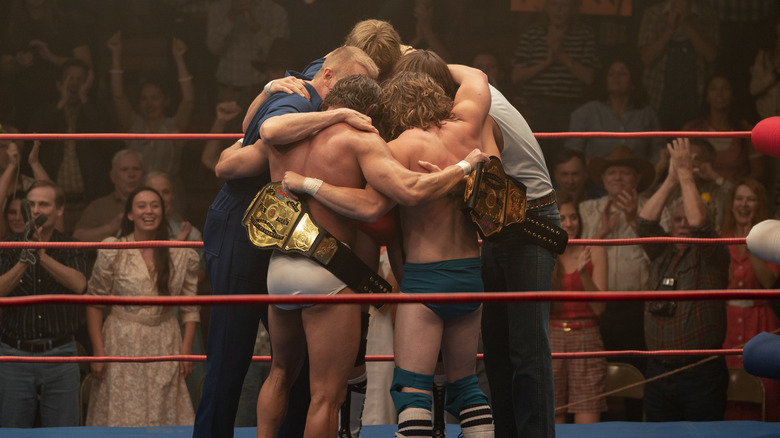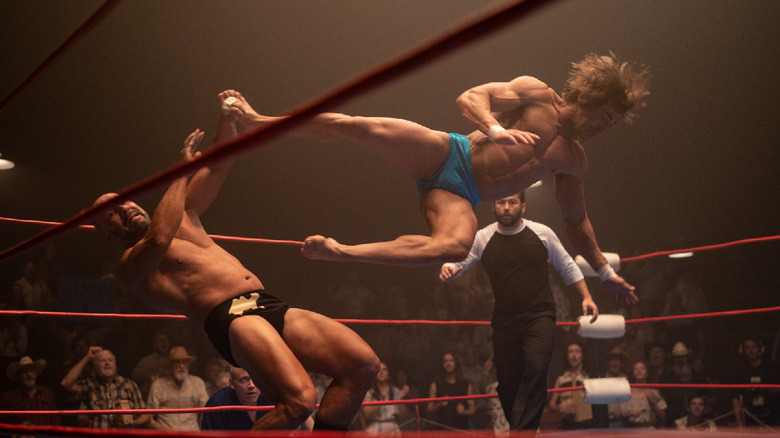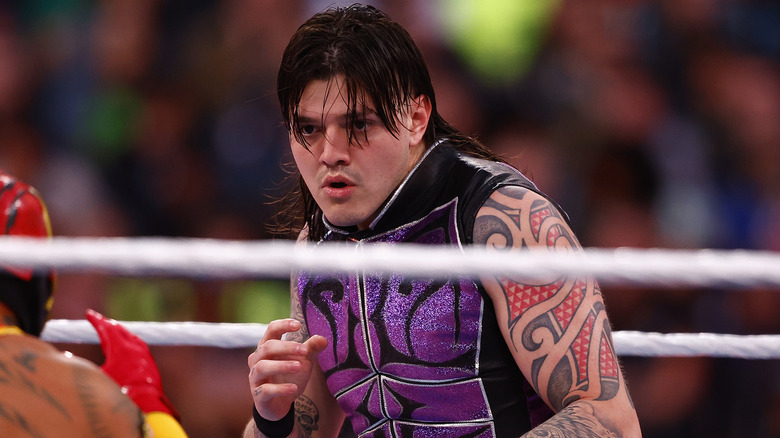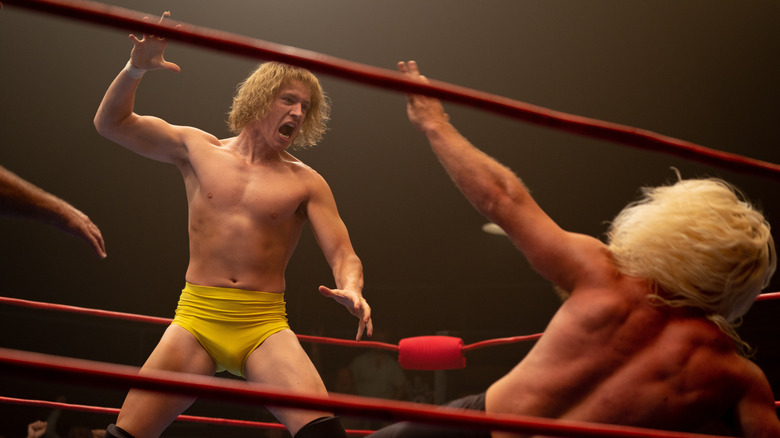Chavo Guerrero Jr. On Making The Iron Claw, Training Zac Efron, And More - Exclusive
As part of one of the most famous families in pro wrestling history, third generation wrestler Chavo Guerrero Jr. has just about seen and done it all. But even though Guerrero has retired from the ring, the one-time ECW World Champion and WWE Tag Team Champion continues to use his experience and knowledge of the sport in new venues, including doing some acting as well as working as a wrestling coordinator on TV series like "GLOW" and "Young Rock."
Now Guerrero has taken on the job of wrestling choreographer for writer-director Sean Durkin's new movie, "The Iron Claw." The film is based on the true story of the Von Erichs, the legendary Texas wrestling family led by former fighter Fritz Von Erich (Holt McCallany). Fritz runs his World Class Championship Wrestling independent promotion while driving his four sons — Kevin (Zac Efron), David (Harris Dickinson), Kerry (Jeremy Allen White), and the reluctant Mike (Stanley Simons) — to vie for the title, although the pressure brought to bear by Fritz ultimately leads to unspeakable tragedy.
Tasked with training the actors and coming from a family of wrestlers himself, Guerrero tells Wrestling Inc. in our exclusive interview that he felt a personal connection to "The Iron Claw," while also stating that it's a movie even non-fans can enjoy: "You don't have to be a wrestling fan to see this movie," he says. "It's about a family. They just happen to be wrestlers. Is there wrestling in it? Absolutely. But this movie has got such a great family dynamic and Sean Durkin, the director just really captured that."
What Chavo Guerrero says about the real Von Erichs
You grew up in Texas. Did you know the Von Erichs? Did you watch them growing up, before you into the ring yourself?
Chavo Guerrero Jr.: Growing up in Texas ... Now, I grew up in Texas. But then again, [I grew up in] Texas and Los Angeles, both times where my dad was wrestling for the Olympic Auditorium. But yes, absolutely, because at the time there's a few wrestling families in Texas, but one of them was the Guerreros in El Paso and one of them was the Von Erichs in Dallas.
So there was a very big rivalry between the Guerreros and the Von Erichs. Being a wrestling family, we always think we're the best. So we're always against them, seeing them get their accolades or them seeing us get our accolades and it was definitely a rivalry for sure. So it was very cool to be able to help tell this story from a family that I respected on both ends.
Based on what you knew of them and what you saw throughout those years, how well would you say the movie nails the characterizations of Fritz and the sons?
Well, there's always two different wrestling promoters you see. You see the wrestling promoter who deals with wrestling, the wrestlers, and the fans, and you deal with the wrestling promoter who is a father as well. Two different things. My grandfather Gory was a great, great example of that.
When they're in the wrestling world, they're bad-asses, they're tough; they have to be. When you're around your families, two different things. So I believe that Sean Durkin, the director of "Iron Claw," really captured very well the dynamic of the intertwinings of a wrestling family, wrestling promoter and a father.
Guerrero on pro wrestling then and now
How has pro wrestling changed since the days of independent promotions, like WCCW?
Oh, very much. It's night and day now. It's not even the same business, in a sense. It's really not even almost wrestling in a sense now. My grandfather started wrestling in the '30s. So wrestling has fed our family for over 85 years and is still feeding our family. But we grew up wrestling, wrestling, wrestling, wrestling. It was like they just counted the wrestling knowledge into us.
I remember having a wrestling ring in our backyard, not a swing set. We had a wrestling ring, that was our swing set. But I wanted to go hit the ropes and jump off ropes and the very first thing my family would tell me is like, "No, no, no. You learn to amateur wrestle first." Before they wouldn't even let me hit the ropes and stuff. I would do it behind their backs, but we learned how to amateur wrestle and strike and jiu-jitsu and how to fall. That's what we had to do first.
Well, wrestling is not really necessarily like that anymore. Wrestling... Triple H said it great. Triple H said, "They're not looking for the next best wrestler, they're looking for the next best entertainer." And that's what we do, we entertain.
That's what you would say has changed the most?
For sure. But it should have been like that the entire time. I always say that I would've been a much better wrestler if I would've been in the Hollywood business first because I would've understood that, I would've understood. It's wrestling moves help tell the story, but the wrestling moves themselves are not the story.
Why getting the story right was important
As a third-generation pro wrestler from a very famous wrestling family, did working as the wrestling choreographer on this have a little more personal edge to it than some of the other projects you've worked on, like "Glow" or "Young Rock"?
Well, I always give them 100% every time I'm coordinating a show or a movie. But yes, this absolutely did because nobody understands what a wrestling family goes through being in that business, except for another wrestling family. I could explain it all day long. I can write a book on it; I can shoot a movie on it. But unless you grew up with your dad being gone six months out of the year or coming home banged up and having to go back out ... And back then they didn't make a whole lot of money.
They did it because that was our family business but it was a love of the sport of the business as well. So being able to help tell the Von Erich story — it's the Guerrero story as well. It's the Orton story, it's the McMahon story, it's a wrestling family story. So definitely, I wanted to make sure that it was very, very accurate, at least on my part, as much as I could. And I did tell the Von Erichs when I first started doing this, "Guys, thank you for putting your trust in me. I will help make this story as if I'm making it about my own family."
There was a lot of pride and love in that family, but there was also a lot of pressure to succeed that led to tragedy. And some of that pressure came from the top down. Is there more awareness of people's mental health now as they go into the ring?
Well, sure. I mean, back in the day, there was no such thing as mental health issues. I mean, unless you're just some really crazy person. But now that we are recognizing the whole thing, the mental health awareness and how much that plays a role in everyday life in every business. Wrestling is no different. We really do have to pay attention to that. Then you add in compound concussions and getting hit in the head and traveling and all this stuff. It's a tough business.
How Guerrero turned the Iron Claw actors into wrestlers
Walk us through training Zac and Jeremy and Harris and Stanley. What was that like? How do you think they responded to it and who do you think changed the most over the course of the training they went through?
It's all different. Anytime I get an actor in the ring, it's different. It's like having a student. You can't just teach one way to all of your students. A good teacher always adapts their teaching to their student. So these aren't my students. I'm training them to look like wrestlers in wrestling scenes. These are actors, these are grown men that A24 and Sean Durkin are trusting me to train them and be safe.
So it's a different dynamic than actually training a pro wrestler. But these guys, I have these actors that they're at the top of their game for a reason. They're overachievers, they come ready and prepared. It's not like I have to get them motivated and say, "Come on guys, let's get in the ring. Let's stop talking." No, these guys are ready to work. They're here for a reason. And that really made my job a lot easier.
And every one of them surprised me every single day. Every time we'd get in the ring, they'd be doing something different that I didn't know that they could do. I'm like, "Wow, okay, that's great. Let me take that and let me add that into a choreography or something." Or, "Hey, man, I have an idea. You think can do this?" And they would all work differently about it.
So Jeremy Allen White would almost sit in the corner for a second and kind of visualize it and visualize and visualize. And he'd be like, "Okay, I'm ready." Zac? I would walk through things with Zac, "Okay, let's do this." And everybody's different how they do it, but they all get the job done. And if you see the movie, these guys are amazing and they look like they're pro wrestlers.
Would you say that they came out of it with a different view of what pro wrestling is and what the demands of it are?
I mean, not that they didn't respect it before, they just didn't know a whole lot about it. Now they're like, "Wow, we didn't realize ..." Jeremy said it the best, I think. He said, "It's almost the things you do in between the moves that mean the most." I said, "Absolutely." I would tell these guys, "Moves don't make a wrestler great. It's the things they do in between that makes a good wrestler, a great wrestler."
Chavo Guerrero says Dominik Mysterio is 'killing it'
Speaking of great wrestlers, what do you think about what Dominik Mysterio is doing?
He's killing it. He's not supposed to be as good as he is this young in his career. I say that, I'm like, "Wow, he's far and beyond. Far above and beyond stuff that I was doing." ... I mean, he progressed very fast, very rapidly. And I just say that he's not supposed to be this good, at least not yet.
You mentioned before all the great wrestling families. Putting the Guerreros at the top, who do you think comes after the Guerrero family in wrestling?
Well, I appreciate that. There's so many great wrestling families and it's very hard for me to say who's better, who's better, who's better this. We all were really good at certain different things. But you have the Von Erichs, you have the Ortons, you have the Funks, you have the Rhodes, you have the McMahons.
One that gets overlooked a lot and I think could be the best wrestling family is the Samoan Dynasty. You got so many of them that have been world champions and are just amazing. The Fatus, the [Johnsons], the Roman Reigns, the Yokozunas, that's all the same family, the Usos. It's pretty amazing. Peter Maivia, the Tongas, the Hakus, that's a family that any one of them comes out and they're amazing.
Wrestling is becoming more visible in movies and TV shows
Before we go, why do you think wrestling lends itself so well to movies and TV shows? Why do you think guys like The Rock and Bautista and Cena have been able to go into careers as actors?
Wrestling for years in Hollywood, at least, had kind of a carny stigma to it, to where Hollywood didn't get it in a sense. And now all of a sudden you've got The Rock, the highest paid, most popular actor in the world. Guys like Cena, guys like Bautista, they're not just putting out these incredible performances and really good films that are entertaining — people were paying to go see them.
So Hollywood's really understanding like, wow, these wrestlers aren't just these one or two-dimensional actors or performers. They're much more than they actually were portrayed in the past. So I'm trying to bring that on the opposite end. Let those guys be on camera. I did all that for a long time. Now I'm trying to bring and show what we can do behind the camera as well.
What you did with these actors in the movie is really something. It was fascinating to watch.
You don't have to be a wrestling fan to see this movie. This movie, it's about a family. They just happen to be wrestlers. Is there wrestling in it? Absolutely. But this movie has got such a great family dynamic and Sean Durkin, the director just really captured that ... It's such a great, great story.
"The Iron Claw" opens in theaters on December 22.
